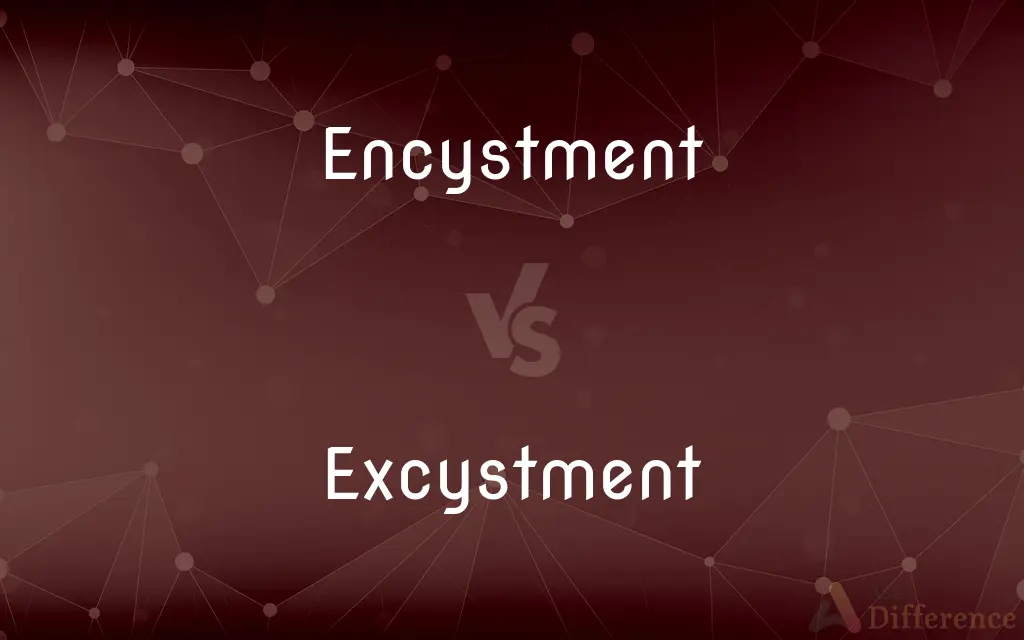Encystment vs. Excystment — What's the Difference?
By Fiza Rafique & Urooj Arif — Updated on May 7, 2024
Encystment is the process where an organism forms a protective cyst, often for survival, whereas excystment is the emergence from the cyst, usually when conditions improve.

Difference Between Encystment and Excystment
Table of Contents
ADVERTISEMENT
Key Differences
Encystment involves the organism forming a cyst to withstand unfavorable conditions. Excystment, on the other hand, is the breaking open of the cyst when favorable conditions return.
During encystment, the organism's metabolism slows down significantly to conserve energy. In contrast, excystment restores normal metabolic activity as the organism returns to its active state.
Encystment helps protozoa and certain other organisms avoid extreme temperatures, desiccation, or scarce resources. Excystment, however, enables them to resume their life cycle once conditions improve.
Encystment typically leads to a dormant stage where the organism becomes inactive. During excystment, the organism exits dormancy and often seeks food or reproduction opportunities.
Encystment is a defense and survival strategy often used by parasites and free-living protozoans, while excystment is vital for resuming activity and infectivity.
ADVERTISEMENT
Comparison Chart
Definition
Formation of a cyst for protection
Emergence from the cyst
State
Dormant, low metabolism
Active, resuming metabolism
Purpose
Survival during adverse conditions
Resuming life cycle under better conditions
Organisms
Parasites, protozoa, fungi, algae
Parasites, protozoa, fungi, algae
Timing
When conditions worsen
When conditions improve
Compare with Definitions
Encystment
Formation of a cyst.
The protozoa undergo encystment in response to nutrient scarcity.
Excystment
Reactivation of metabolism.
Excystment reactivates the protozoa's metabolic processes.
Encystment
Dormancy induction.
Encystment allows organisms to remain dormant for long periods.
Excystment
Host infection.
Excystment often marks the start of infection in the host.
Encystment
Protective strategy.
Parasites adopt encystment to evade the host's immune system.
Excystment
Return to active state.
Following excystment, the amoeba resumes feeding.
Encystment
Cyst wall development.
During encystment, the cyst wall becomes thicker for added protection.
Excystment
Emergence from a cyst.
Upon excystment, the parasite actively invades the host.
Encystment
Energy conservation.
In encystment, organisms conserve energy by reducing metabolism.
Excystment
Environmental cues.
Temperature changes often trigger excystment in parasites.
Encystment
To enclose in or as if in a cyst.
Excystment
The process, or the result of excysting
Encystment
To take the form of or become enclosed in a cyst.
Encystment
The formation of a cyst.
Encystment
The process of becoming enclosed by a cyst.
Encystment
A process which, among some of the lower forms of life, precedes reproduction by budding, fission, spore formation, etc.
Encystment
A process by which many internal parasites, esp. in their larval states, become inclosed within a cyst in the muscles, liver, etc. See Trichina.
Common Curiosities
How does encystment help parasites?
Encystment helps parasites avoid the host's immune system and survive harsh external environments.
What triggers encystment?
Environmental stressors like temperature changes, nutrient scarcity, or dehydration can trigger encystment.
Does excystment require energy?
Yes, excystment reactivates the organism's metabolism, which requires energy.
Are encystment and excystment reversible processes?
Yes, the processes are generally reversible, depending on environmental conditions and the life cycle of the organism.
Is encystment always followed by excystment?
Typically, excystment follows encystment once favorable conditions resume, allowing the organism to thrive again.
How do environmental cues affect excystment?
Cues like temperature change, moisture, or chemical signals can stimulate excystment.
Can encystment occur multiple times in an organism's life?
Yes, organisms can encyst multiple times throughout their life cycle as needed.
Is excystment immediate once conditions improve?
Excystment may not be immediate and could require specific cues or time before fully reactivating.
When does excystment occur?
Excystment generally happens when favorable conditions return, such as an increase in temperature or nutrient availability.
What organisms undergo encystment and excystment?
Protozoa, certain fungi, algae, and parasites often undergo both processes for survival and lifecycle continuation.
How does excystment affect parasite infectivity?
Excystment increases infectivity as parasites often become more active and seek out hosts.
Is encystment exclusive to single-celled organisms?
While common in single-celled organisms, some multicellular parasites can also form cysts.
Do all cyst-forming organisms excyst?
Most cyst-forming organisms excyst when conditions are favorable, though some may remain dormant for longer periods.
Does encystment only occur in parasites?
No, encystment also occurs in non-parasitic organisms like free-living protozoa and algae.
Can excystment lead to disease in hosts?
Yes, excystment often coincides with disease onset when parasitic organisms infect their hosts.
Share Your Discovery

Previous Comparison
Reaction vs. Reflex
Next Comparison
Facial vs. BleachAuthor Spotlight
Written by
Fiza RafiqueFiza Rafique is a skilled content writer at AskDifference.com, where she meticulously refines and enhances written pieces. Drawing from her vast editorial expertise, Fiza ensures clarity, accuracy, and precision in every article. Passionate about language, she continually seeks to elevate the quality of content for readers worldwide.
Co-written by
Urooj ArifUrooj is a skilled content writer at Ask Difference, known for her exceptional ability to simplify complex topics into engaging and informative content. With a passion for research and a flair for clear, concise writing, she consistently delivers articles that resonate with our diverse audience.
















































